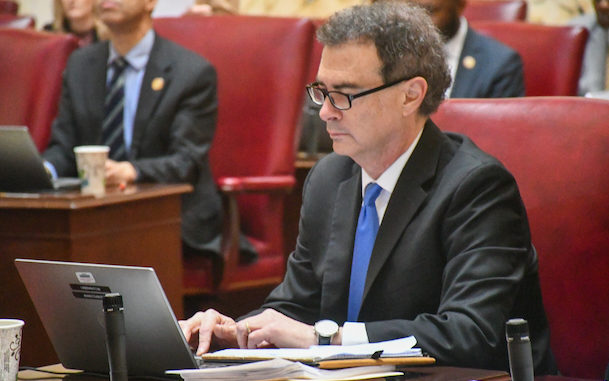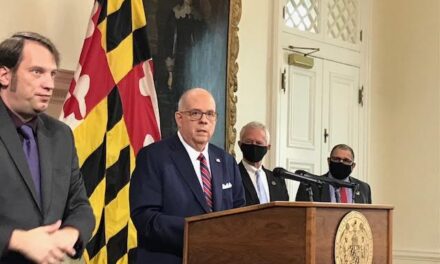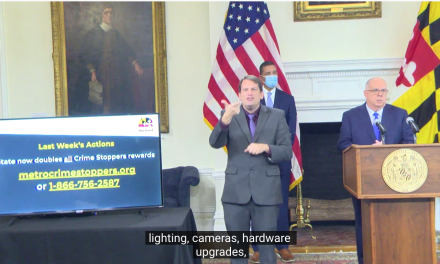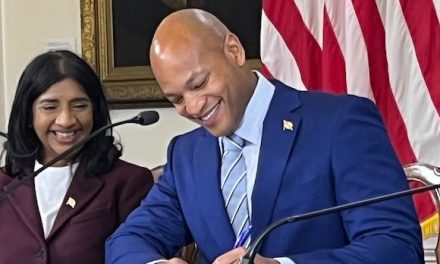By KARA THOMPSON
ANNAPOLIS, Md. — One of the biggest changes to state education policy to come out of the Maryland General Assembly this session didn’t actually originate from lawmakers – it came from the new attitude in the governor’s office.
Gov. Wes Moore emphasized access to a good education for all in Maryland, and demonstrated he isn’t afraid to spend money on ensuring that.
When the Blueprint for Maryland’s Future school reform plan passed in 2021 by the Maryland General Assembly, it came on an override of former Gov. Larry Hogan’s veto of the bill. In contrast, Gov. Wes Moore allocated an extra $500 million on top of the required amount for funding the Blueprint and shifted some transportation funding into education, for a total of $900 million excess dollars.
“To have a governor that not only is willing to talk with you, but collaborate and work in partnership on ideas is refreshing,” said Cheryl Bost, president of the Maryland State Education Association. ”It really speaks to his character and his priority for education and eliminating childhood poverty, because a lot of that is tied to education.”
Moore continued to demonstrate his dedication to improving education in Maryland through the Maryland Educator Shortage Reduction Act of 2023, one of his 10 proposed pieces of legislation for the 2023 General Assembly session that ended April 10.
“The pandemic dealt a serious blow to our education workforce. Teachers are tired, strained, and overworked – and they need reinforcements, here and now. That is why I am calling on the General Assembly to pass the Maryland Educator Shortage Act – to strengthen the pipeline of qualified teachers in our state,” said Moore in his state-of-the0-state address at the beginning of February.
The bill, which currently sits on the governor’s desk, seeks to establish specific recruitment and retention goals for teachers in the state.
“We are really happy that it’s another tool that can be used during this historic educator shortage time that we’re in,” Bost told Capital News Service.
More tools are needed, though, to fully staff schools, including a Grow-Your-Own program, cut from the bill, which aims to recruit educators who will teach in their own communities and help those who are aiming to be teachers in different areas like offering scholarships or helping create partnerships with schools, she said.
But teacher shortages are not the only shortages faced in education, both in Maryland and nationwide.
“We have lots of vacancies, as parents know, with bus drivers or paraeducators that work with students or cafeteria workers and just as we have historic vacancies in teachers and administrators, we also have vacancies in these positions that we have to address,” Bost said.
In the future, she hopes to see a work group created to study why these vacancies exist, how they can retain workers, and consider appropriate wages.
Another bill Bost was excited to see pass this session was one that would require teachers to receive training for virtual education and provide the option for counties to have virtual school days in cases of extreme weather.
“We know that post-pandemic we’re still going to have some virtual schools or at least virtual programs, and we wanted to make sure that they were top-notch,” she said. Baltimore City and Baltimore Democrat Sen. Mary Washington’s bill, she said, put “in some really good guardrails” to bring parity to virtual schools with physical schools.
It was down to the wire before the deadline for adjournment when the Senate took up discussion on the bill, but it finally passed with a majority just minutes before the session came to a close at midnight.
In addition to bills that directly pertain to education, many proposals from this session will have a far-reaching impact on many aspects of life, including education.
The Maryland Education Coalition was tracking a bill from Del. Stephanie Smith, D-Baltimore City, that would establish a neighborhood tier system to determine the number of students eligible for reduced or free lunch at school.
“We think that the neighborhood tiers is probably the most accurate way to count poverty and we want to move towards that, but I don’t think the legislature was quite ready, and I think it’s a very complicated formula, honestly, to look at, so that’s something I think will come back next year,” said Ellie Mitchell, co-chair of MEC. “That may end up increasing the overall cost of the Blueprint, when we have students counted the way they should be.”
In addition to pushing for future passage of that bill, MEC also wants to focus on what Ricky Tyler, who co-chairs with Mitchell, calls “student services,” aka their social, emotional, mental, and behavioral health, as well as juvenile service issues.
“We need to look at (these issues) because that is part of ensuring that the kids come ready to school, ready to learn,” he said.
Oddly, of the almost 100 bills the governor signed the day after adjournment, just one was related to education: the use of alcoholic beverages for educational purposes. SB672, which was cross-filed with HB987, allows students 18 and up to taste certain alcoholic beverages as a part of an educational class.
Other education-related bills awaiting his signature now are an update to the Maryland State School Health Services guidelines regarding anaphylactic food allergies and for local school boards to disclose foods served in the schools as well as the major allergens they contain; and one that requires public schools to disclose information to students, staff, and parents about Title IX coordinators and the processes and supports in place for those who file sexual misconduct complaints.







Recent Comments